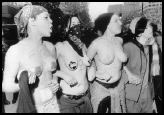Back in the late ’70s, many young queers like me were doing two things while newly making our way in the world: feeling out various activist scenes, and screwing every guy in sight. This was also the time of the first wave of punk rock, a direct reaction to the banality of disco, and among pissed-off teens there was a lot of impatience—even contempt—for the older activists who couldn’t let go of what they’d seen and done in the ’60s. “Yeah, gramps. Sure. Why don’t you go smoke another joint or something?”
Young queer men must feel similarly today. But most of the guys I hung with (so to speak) in that era have died—either quickly, from drugs, or slowly, from drugs, or, most often, slowly and painfully from AIDS. And many of the young queer men populating Seattle’s clubs today weren’t even born then.
For several years now in Seattle, there’s been a striking disparity between queer women and queer men in how engaged they are with the community. It’s impossible to separate that phenomenon from the impact of AIDS. After a hastily organized protest in 1990 against an appearance by homophobic talk-show host “Doctor” Laura Schlessinger, the 30-year-old man who single-handedly pulled it together, Pete Gregson, noted that “we had a whole generation who died off. . . . Dr. Laura activists were either very old or very young.”
The generation of queer guys who would normally be community leaders today are either dead, burned out, or, seemingly, feel like they’ve earned the right to some time off. That explanation can’t hold forever, and younger queer men today have got to be sick of hearing it—sick of the HIV war stories or of the self-perpetuating service organizations that, in the era of protease inhibitors, are depoliticized or scrambling to find ways to help other sick people. “Yeah, gramps. Sure. ACT-UP did some cool stuff. Why don’t you go take another hit of poppers or something?”
But the analogy with peaceniks in the low-ebb late ’70s—the disinterest of most young gay men, and the lack of any meaningful and visible outlets for the minority who wanted to care—only goes so far. Today’s complacency wouldn’t have been possible without the leadership and, yes, militancy of the gay men of 15 and 20 years ago. Moreover, identity politics is alive and well and thriving among Seattle’s lesbians. For three years now, the once-moribund Lesbian Resource Center has been revitalized, as have more radical groups like Dyke Action.
It’s easy to forget (and many men do), but lesbians and bisexual women were there through the Bad Old ’80s, too. Nationally, women like Urvasha Vaid and Audre Lorde were every bit as critical as any ACT-UP leader in making queer rights an enormous movement, and in making research and treatment for HIV/AIDS a national priority. They were an integral part of that movement, despite being confronted with the stunning sexism and even misogyny of some gay men. And they brought to that struggle the same experience and skills they brought to countless other progressive and radical issues where lesbians were quietly influential throughout the last three decades.
Today, women confront an epidemic in which queer women are particularly discriminated against in health care and research. It’s called breast cancer, and gay men are nowhere to be found in the battle against it.
Check out, if you will—if you can stomach the corporate beer floats and stale disco music blaring from local clubs’ floats—the presence of political, personal issues like breast cancer at this year’s “Freedom Day” parade. Chances are that they’ll be ghettoized to a speaker here or a booth there, while the “freedom” celebrated is mostly the freedom to make out with the gender of one’s choice.
That’s a freedom largely taken for granted in large cities on the East and West Coast, which helps explain the growing irrelevance of the event itself. Without any emphasis on the secondary issues where bigotry still exists—or the cities, some of them not far away at all, where it’s still very much unsafe to be out and visible—what’s left is the same old party, where the speakers are ignored by almost everyone and the biggest emphasis is on the hope for good weather.
Contrast that with 15 years ago, when AIDS was on the lips of every speaker, regardless of gender, and it’s understandable why lesbians now have their own, smaller, rowdier march the previous evening. Unlike a lot of the men, many of Seattle’s queer women still believe there are things worth fighting for. The right to party isn’t one of them.








